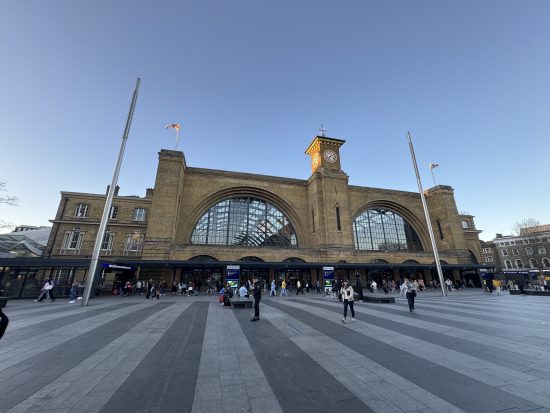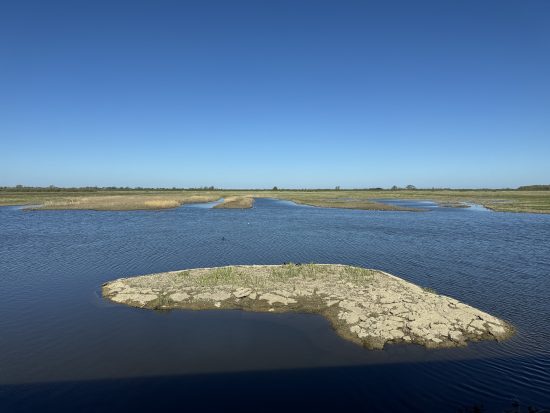Yesterday I was in London all day, celebrating my elder son's birthday.

Today I am now in a place I much prefer:

Both are unedited iPhone images, both taken at wide angle.
In both locations I have had the opportunity to observe the behaviour of crowds.
I admit I am no longer a lover of human crowds. The hustle, dodging and rushing is something I no longer appreciate. The uniformity of appearance of the human crowds in London, and at the same time the frequent illogicality of human behaviour, is harder to accept when I know that it is possible to escape to a place where such crowds do not exist.
On the other hand, the behaviour of the hundreds of ducks in the second view, at Welney, this morning is more predictable. There are mallard, pochard, gadwall, wigeon, tufted ducks, shoveler, coots, moorhen, shellduck, teal and maybe more (there is rumour of a garganey) out there in front of me. But when a female harsh harrier - looking fabulous, it had to be aid in that sunshine - came over, they all reacted as one.
Some resettled on the water quite quickly, having previously been on the land. They are much safer there.
Others - mainly the teal - took time to do so. They are very nervous birds.
I could not help but think of the reaction to tariffs. I thought of Trump in the role of the marsh harrier - who will catch something today, but not that I have seen so far - and the ducks of all varieties caught in the marsh harrier's potential line of sight, as the equivalent of the countries and markets caught by tariffs, and now panicking as a result, just as those birds did.
Is the response of those countries who resettle quickly, rational? Possibly. If, that is, they find a new structure that delivers the security they crave.
What about markets, whose behaviour might be more like the panicking teal for a while? Their behaviour is not so rational, but their fear is real - and so not to be dismissed.
The point is that the ducks panic en masse as a survival technique, and it works, by and large.
We do not need to replicate it.
We can work out that Trump's strategy need not, and even cannot, work.
We can co-ordinate a response if we have sense.
We can turn on the predator.
We can actually thwart it.
But the choice to do so is for us, or at last our politicians, to take. Will we?
If we do it does not look as though it will happen as a result of leadership from the UK. There may be wiser heads elsewhere. I hope so.
Meanwhile, Trump, no doubt like the marsh harrier, is enjoying the mayhem he is causing.
Thanks for reading this post.
You can share this post on social media of your choice by clicking these icons:
There are links to this blog's glossary in the above post that explain technical terms used in it. Follow them for more explanations.
You can subscribe to this blog's daily email here.
And if you would like to support this blog you can, here:


 Buy me a coffee!
Buy me a coffee!

Hmm Mango as a Marsh Harrier? Doesn’t work for me – lumbering oaf (over fed vulture?).
If you want a metaphore for USM(ango) and Europe I prefer this:
https://www.youtube.com/watch?v=DFjbYdX-KUs
The overmuscled (USA?) vs real power (Ukraine as is happens – he comes from same village as ours guest’s mother). The expressions on the “power lifters'” faces are hilarious (man in overalls = not very muscled etc. It is not size that counts – ditto USA – Europe.
& yes, crowds have always made me nervous.
Thanks
The marsh harrier just wants dinner, Trump is well fed.
Seems we’re all being pulled into Trump’s psycho drama, his constant need to project vulnerability into others, his MO is coercive control upscaled. It’s a complex method of control.
But yes the desired outcome is to induce fear, paralysis, control and capitulation.
Good distinction
They might feel panic as individuals for a short time, but flock threat response is not mass panic – mass panic would be the Harrier dispersing the flock to the four winds, and they re-grouping in smaller clusters with many not rejoining the flock at all.
What’s happening is far more interesting and encouraging. They panic, move away sharply but to a minimal distance – then re-form as a flock. They do this because after the initial shock, they remain focused primarily upon each other – the Harrier cannot break the mutually reinforcing individual relationships within the flock.
There’s a lesson in that.
Agreed
Thanks
Shellducks – are they the same as Ruddy Ducks? Our classic sailing boat is called Ruddy Duck. The love of my life – as well as husband of course! Smile.
We hope to have her back in the water this year, she’s had a serious re-build, but still needs a lot of varnishing work done. Can’t wait to get back to Bwlchtocyn so husband can start the work, hopefully in time for this Summer’s sailing.
And I’m hoping that maybe I’ll get out for a single sail. That would make me incredibly happy. Round the St Tudwals Islands (including the one now owned by Bear Grylls – grrr!) and back.
There used to be black rabbits on the other one (East), but I think they all died off when the then owner (Carla Lane) put deer on the island. At least I got to see the black rabbits when they were still there.
Sorry – as usual gone very much Off Topic!
The ruddy duck could cross breed with the shellduck
All uk ruddy ducks were escapes. Over the last two decades they have been culled to the oiling of extinction in the U.K. to protect the native shellduck. There are handfuls at most left.